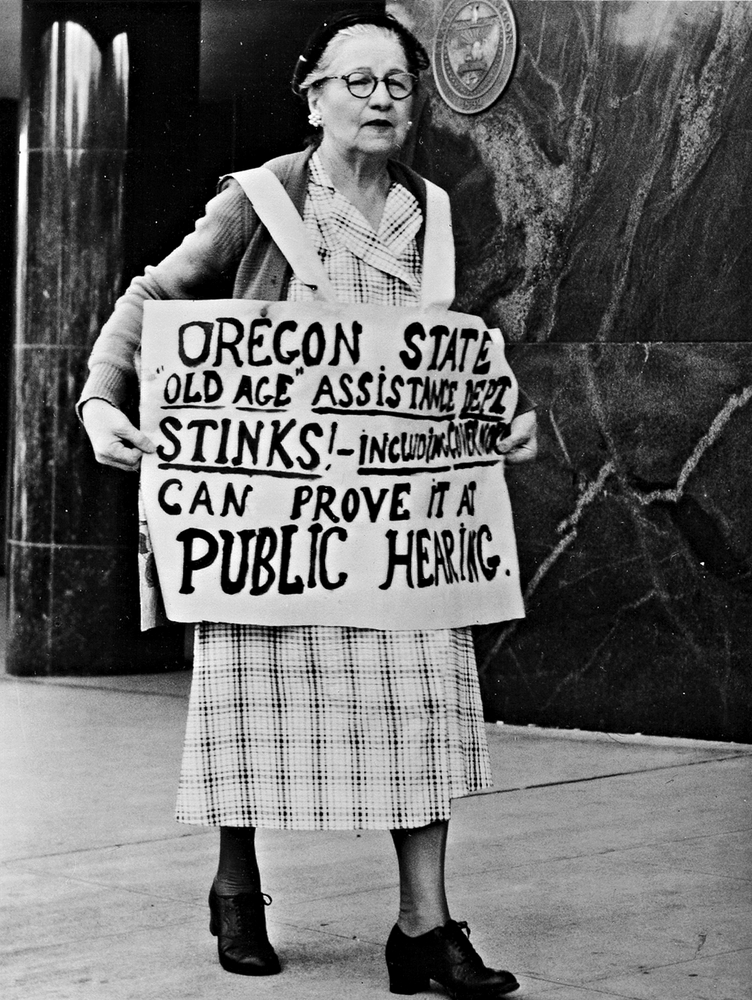Grace Wick was a political gadfly in Portland, where she was an activist against the New Deal. While she had once been involved in mainstream politics as a supporter and friendly acquantaince of Democratic Governor Walter M. Pierce, the Great Depression crushed her economically, and she was increasingly attracted to the marginalized politics of right-wing America.
Wick was born on March 7, 1888, in Harlan, Iowa. She was an actress on the East Coast and then moved to Jackson County in 1922. There she actively helped Pierce in his successful 1922 gubernatorial campaign. In 1927, she moved to Portland and worked as an actress and radio producer. She continued to be politically active, and, according to biographer June Melby Benowitz, “began both a crusade against capital punishment and an attempt to destroy the political career of Governor Pierce.” Politics were personal for Wick, who turned against Pierce after he refused to pardon the son of a friend who had been sentenced to death.
Wick campaigned for Franklin D. Roosevelt in the 1932 presidential election and in 1934 ran unsuccessfully for Congress as a pro-Roosevelt Independent. Nonetheless, when Roosevelt’s relief programs failed to help her find long-term work, Wick turned against Roosevelt and the New Deal. In May 1935, she marched down Broadway wearing a barrel plastered with political slogans, including “One of the Forgotten Women of the New Deal!” and “The New Deal of Oregon stinks.”
Wick often used humor in her writing and political appeals. In 1936, she announced her candidacy for Portland’s mayoral election, offering “a kiss for everyone in Portland,” but she soon dropped out of the race. The same year she ran for Congress, losing badly to Nan Wood Honeyman, who was the first woman elected to that office from Oregon.
As Wick’s economic difficulties continued, she bitterly focused on blaming immigrants, Jews, and Communists for national and international problems. She opposed America’s participation in World War II and joined right-wing groups, including the National Gentile League and the American Woman’s Party.
Grace Wick was an activist at a time when politics were becoming an acceptable realm for Oregon women; however, she did not significantly affect state politics. Nonetheless, using humor and a talent for self-publicity, she managed to make herself, and her extreme views, known. Wick died in 1958 in Portland.
-
Grace Wick, July 1957.
Oreg. Hist. Soc. Research Lib., ba019192
-
![]()
Grace Wick, dressed in a barrel poses while parading through the streets looking for a job, 1935.
Oregon Historical Society Research Library, ORHI81084
-
![]()
Lewis & Clark Centennial token with Grace Wick's name and birth place, 1905.
Oregon Historical Society Museum Collection, 1959-60.11
Related Entries
-
![Julia Ruuttila (1907-1991)]()
Julia Ruuttila (1907-1991)
Julia Ruuttila was a labor and investigative journalist, a poet and fic…
-
![Nan Wood Honeyman (1881–1970)]()
Nan Wood Honeyman (1881–1970)
Nan Wood Honeyman made history as the first woman elected to the U.S. H…
-
![Walter Pierce (1861-1954)]()
Walter Pierce (1861-1954)
Walter Pierce's long public career extended from the 1890s to the polit…
Related Historical Records
Map This on the Oregon History WayFinder
The Oregon History Wayfinder is an interactive map that identifies significant places, people, and events in Oregon history.
Further Reading
June Melby Benowitz, Days of Discontent: Women in Right Wing Politics, 1933-45. DeKalb: Northern Illinois University Press, 2002.
June Melby Benowitz, Grace Wick: Portrait of a Right-Wing Extremist.” Masters thesis, Portland State University, 1988.






